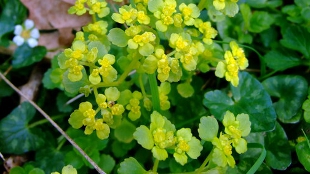 Opposite-leaved golden saxifrage, which grow in damp ditches in Wales in early spring WIKIMEDIA COMMONS, CERIDWEN
Opposite-leaved golden saxifrage, which grow in damp ditches in Wales in early spring WIKIMEDIA COMMONS, CERIDWEN
Researchers in Wales have recorded identifying DNA sequences for more than 1,100 plants and conifers, representing all of the country’s native flowering plants and 75 percent of the flowering plants in the United Kingdom. It is the first country to create such a database, according to the National Botanic Garden of Wales, which is organizing the effort, called the Barcode Wales project. All the barcodes are freely available on the Barcode of Life Database (BOLD).
Natasha de Vere, head of conservation and research from the National Botanic Garden in Carmarthenshire, and her colleagues will now turn to nonnative species introduced by humans. The whole project is expected to last 3 years.
“Wales is now in the unique position of being able to identify plant species ...



















